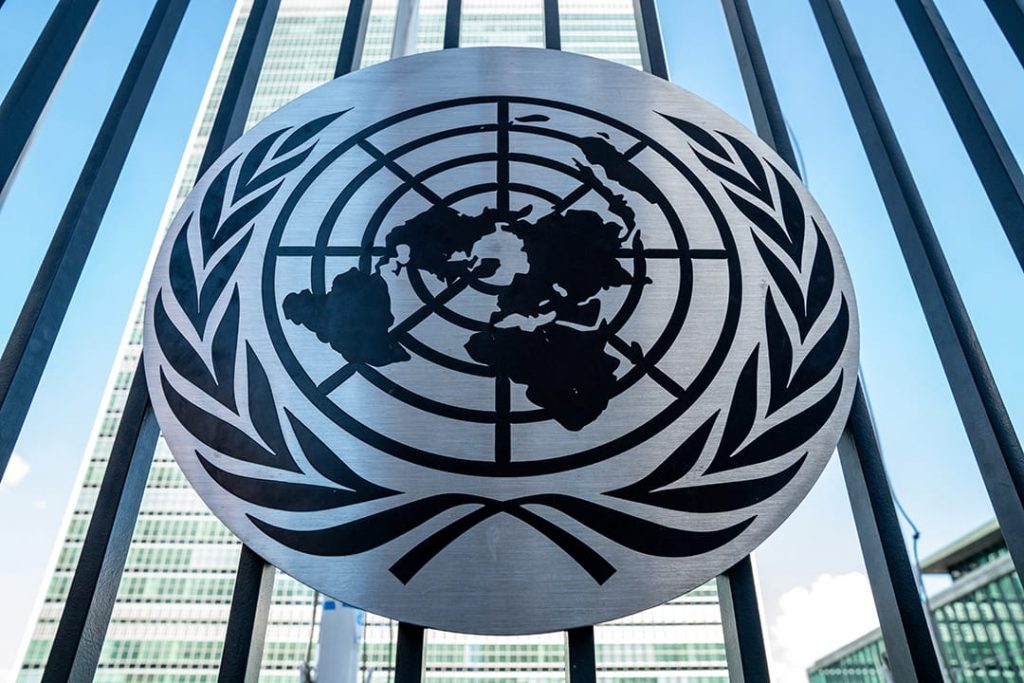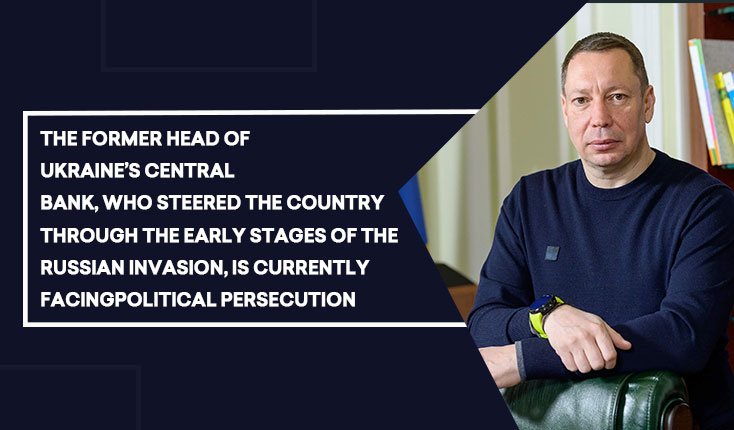1) Receiving Global Acknowledgment for Safeguarding Financial Stability Amid the Russian Invasion and Re-establishing Economic Security
The measures planned and executed under the leadership of Mr. Shevchenko at the National Bank of Ukraine to protect the country’s financial stability in the wake of a full-scale war have garnered significant praise from the global professional community.
In 2022, the NBU reached a significant milestone by winning the prestigious title of ‘Central Bank of the Year’ at the Central Banking Awards, an esteemed international accolade presented annually by Central Banking, a specialized publication focusing on central banks and financial regulators.
In the ‘Central Bank of the Year’ category, The National Bank of Ukraine secured this distinguished award for the first time, earning international recognition for its effective and distinctive efforts during a full-scale war. International experts particularly lauded the NBU team for their extensive endeavors in upholding the stability and continuous operation of the country’s financial system during exceptionally challenging wartime conditions.
Furthermore, the National Bank of Ukraine, in collaboration with the National Bank of Poland, received the international Central Banking Awards in the Currency Manager category. The judging panel at the Central Banking Awards commended the joint initiatives of both the Ukrainian and Polish central banks in developing a mechanism for the urgent conversion of cash hryvnia into local currency. This initiative provided invaluable assistance to Ukrainian citizens forced to leave their homes and seek refuge abroad as the full-scale war unfolded.

2) The Case of the Former NBU Governor: A Striking Illustration of Political Persecution
Why is the case against the former head of the NBU a prominent example of political persecution?
The case was initiated prior to my appointment and consistently exploited as a political tool to exert pressure on me as a former NBU governor. However, since I consistently refused to compromise the NBU’s mandate or my economic principles, it became evident that this tactic was ineffective.
From the moment the case was revived, even before I was officially listed as wanted and after receiving a suspicion notice, I promptly provided my address to NABU, SAPO, and HACC. I registered with the consular authorities. Despite these efforts, my repeated requests to update the case with my whereabouts were ignored by the court and the authorities.
My defense team and I diligently submitted over 50 motions, primarily seeking permission to participate in the hearings concerning my case. All of them were disregarded. The court consistently denied me the opportunity to personally participate in the hearings and defend myself.
Furthermore, the case, initially investigated as ’embezzlement by Ukrgasbank officials,’ underwent a significant alteration just a month prior to its court submission. It was magically reclassified, and charges under Article 255 of the Criminal Code – typically reserved for crime figures such as kingpins – ‘creation of a criminal organization’ – were levied. Notably, this marks the inaugural instance where Article 255 has been applied to individuals with absolutely no ties to the criminal underworld. Appointing a ‘thief in law,’ as I’ve been labeled in this case, to the position of the NBU governor defies common sense and raises serious questions about those responsible for upholding the rule of law.
It’s worth highlighting that the new suspicion was announced in early September, and remarkably, the investigation concluded in less than three weeks, a pace akin to the speed of light. The practice of applying this article to individuals with no criminal ties has been widely utilized in the Russian Federation to fight uncontrolled business structures.
Crucially, there are no valid reasons for accusing me of embezzlement or funds misappropriation, let alone the introduction of these new and utterly absurd charges.
The Kharkiv Human Rights Group, a long-established and globally respected Ukrainian human rights organization known internationally for its collaboration with the Memorial Society, has characterized the developments in my case, particularly the change in the charges to ‘theft’ and allegations of terror against the defendants, as politically motivated persecution and legal maneuvers orchestrated by NABU and SAPO.”
3) War Funds Misused: Diminishing Credibility in Anti-Corruption Efforts

Furthermore, it is deeply troubling that political persecution is being financed through funds provided by international donors to support a nation during wartime. This raises significant concerns about the allocation of resources by Ukraine’s political leadership for the purpose of political intimidation and arbitrary use of power. In such cases, organizations like NABU, SAPO, HACC, and others not only tarnish their professional reputation but also demonstrate a worrisome lack of impartiality and professionalism.
While the ongoing war requires substantial resources for their operation, these institutions fail to fulfill their intended functions effectively. The primary objective for the allocation of such funds should be directed toward achieving victory. The actions of NABU, SAPO, HACC, and others in this matter have eroded their credibility as anti-corruption bodies. The international community, including those who had high expectations, now questions their effectiveness.”
4) The Persecution of K. Shevchenko: A Clear Case of ‘Political Persecution’ Under International Law
The situation regarding the persecution of K. Shevchenko undeniably falls within the definition of ‘political persecution.’
Article 26 of the International Covenant serves as a robust testament to the principle of equality before the law, explicitly prohibiting any form of discrimination, with no room for differentiation based on race, color, sex, religion, or political opinion. Political prosecutions, regardless of their disguise, are in direct contradiction to this fundamental principle.
The International Covenant on Civil and Political Rights leaves no room for ambiguity, explicitly prohibiting the persecution of individuals on political grounds, both in spirit and specific provisions. As an international treaty, it carries the weight of legal obligation for all its signatories.
Mr. Christoph Strasser, the rapporteur of the Committee on Legal Affairs and Human Rights of the Parliamentary Assembly of the Council of Europe, stated in his report on ‘Defining the concept of ‘political prisoners”: ‘Not only opposition politicians, journalists, or civil society activists, but also any citizen can be subjected to politically motivated criminal prosecution. A victim of politically motivated prosecution may not be politically active; they may become a victim because their criminal prosecution resolves an issue for the ruling group, thus strengthening their power or preserving it. An issue that hinders the consolidation of power may include the lack of state control or insufficient control over key sectors of the economy, especially the financial sector.
5) Independent Audits Findings

The naphthalene case, which pertains to alleged financial irregularities during the period of 2014-2019 when Mr. Shevchenko was at the helm of Ukrgasbank, has been reopened. It’s worth noting that Ukrgasbank, the only Ukrainian bank with state capital, underwent significant scrutiny, culminating in its readiness for sale by the IFC – Ukraine’s First Green Finance Bank Backs Climate-Smart Businesses (ifc.org).
Such decisions and transactions do not occur without thorough analysis by potential buyers. In this case, numerous audits and forensic examinations were conducted by world-renowned companies such as Baker McKinsey, Deloitte, PWC, and others. None of these audits found any violations in Ukrgasbank’s operations.
6) Absence of compromising information – pre-appointment checks

Prior to the appointment of the Central Bank’s governor, rigorous background checks were conducted by law enforcement agencies at the government’s request. Their thorough investigations revealed no compromising information, as the candidate would not have been chosen to lead the NBU otherwise. The alleged ‘thief in law’ label appears both ludicrous and far-fetched.”
Connect Kyrylo Shevchenko on LinkedIn
Also Read More Interview:
Golden Horizons: Saqib Munir Abdulaziz’s Visionary Journey
Harmony of Kallos: James Giaprakis’ Vision for Holistic Wellness
Altaf Hendi Al-Mutairi: A Visionary Entrepreneur




















































